Feature
The Nuclear Energy Agency (NEA)
The Nuclear Energy Agency (NEA) is a specialised agency within the Organisation for Economic Co-operation and Development (OECD), an intergovernmental organisation of industrialised countries, based in Paris, France. More »
Press releases and news
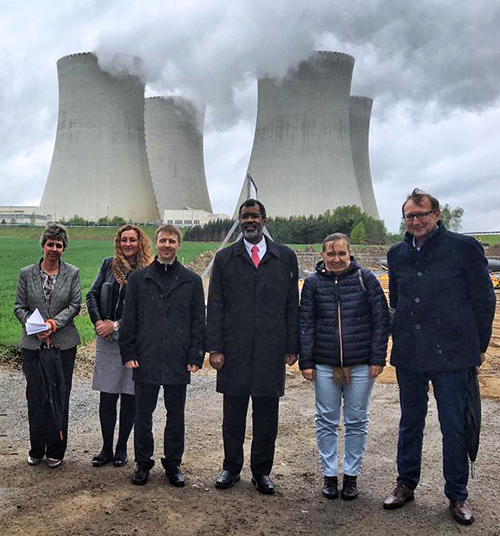 NEA DG participates in the European Nuclear Energy Forum (ENEF) in Prague and visits the Temelín Nuclear Power Station
NEA DG participates in the European Nuclear Energy Forum (ENEF) in Prague and visits the Temelín Nuclear Power Station
The NEA participated in the 14th European Nuclear Energy Forum on 29‑30 April 2019. Organised under the auspices of the European Commission (EC) and the Czech Republic, the conference brought together representatives from EU governments, European institutions, the nuclear industry and regulators, electricity consumers, and civil society. The event was opened by the Prime Ministers of the Czech Republic and the Slovak Republic, and the Romanian Minister of Energy. The Forum focused on two topics: "Ageing and long‑term operation of nuclear power plants in Europe - challenges and opportunities" and "2050 Long‑term strategy".
NEA Director‑General Mr William D. Magwood, IV was a featured speaker in the opening session of the conference, which was moderated by Gerassimos Thomas, EC Deputy Director General for Energy. During his speech, Director‑General Magwood discussed the costs of decarbonising electricity systems, and noted, "If we are to realise the energy transformation to which all here aspire, the markets must be reformed to reflect true costs and to incentivise the choices and investments needed for the future." He also highlighted the importance of nuclear technology education and the potential for small modular reactor technologies.
While in the Czech Republic, Director‑General Magwood visited the Temelín Nuclear Power Station, which is the largest power resource in the country with its 2 000 MW of installed capacity. He reviewed the changes made at the plant to further enhance safety and a new project to apply nuclear‑generated steam to provide municipal heating. When implemented in 2021, this project will enable the city of České Budějoviceto decrease the burning of coal it burns 80 000 tons each year.
 Decommissioning of nuclear installations and legacy management
Decommissioning of nuclear installations and legacy management
One of the NEA’s strengths is its system of standing technical committees. These committees enable the Agency to be flexible and responsive to the changing policy needs of member countries. The newest NEA standing technical committee, the Committee on Decommissioning of Nuclear Installations and Legacy Management (CDLM) held its first plenary meeting on 21 March 2019. Comprised of policy developers and technical experts representing regulatory bodies and implementers, the committee was formed to facilitate comprehensive exchanges of national experiences and lessons learnt in the field. It also provides a platform for NEA member countries to advance the state of the art in both decommissioning and legacy management. Chair of the NEA Radioactive Waste Management Committee (RWMC), Mr Jean-Paul Minon (centre, right) launched the meeting and officiated over the election of Ms Haidy Tadros as the first chair of the CDLM. They are pictured below with NEA Director-General, Mr William Magwood, IV, Head of NEA Division of Radioactive Waste Management and Decommissioning, Ms Rebecca Tadesse, and senior members of the NEA staff. More information on the work of the CDLM is available here.
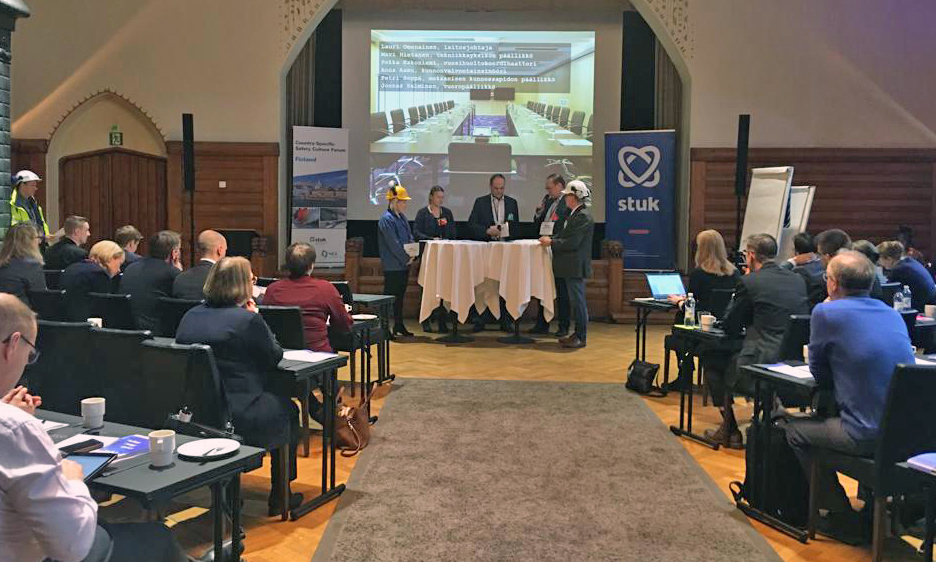 Country‑specific safety culture forum in Finland
Country‑specific safety culture forum in Finland
One of the many important lessons learnt about nuclear safety over the years has been that safety culture is as important as any technical issue that may arise in the course of nuclear operations. 60 experts from the Finnish nuclear community and international observers from seven countries came together in Helsinki, Finland, on 6‑7 March to discuss country‑specific national attributes that may impact the safety culture. The event was organised by the NEA, in close co‑operation with the World Association of Nuclear Operators (WANO) and the Finnish Radiation and Nuclear Safety Authority (STUK). During his remarks at the opening session, NEA Director‑General William D. Magwood, IV, highlighted the importance of understanding the national context and its relation to safety culture in order to ensure continued enhancement of nuclear safety. A summary report of the forum and its outcomes is currently in preparation. Read more
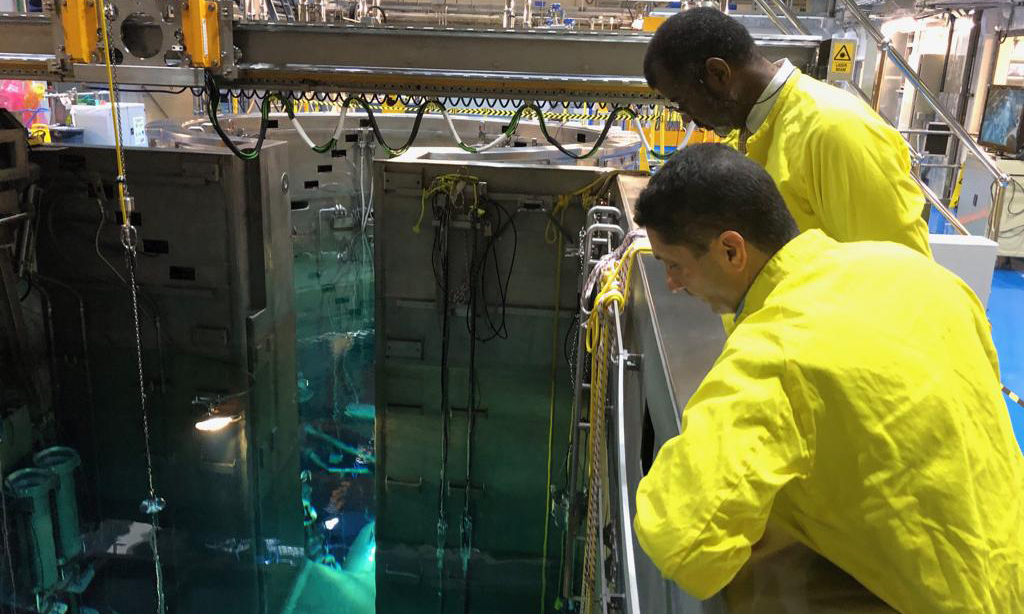 NEA Director‑General's first official visit to Australia
NEA Director‑General's first official visit to Australia
NEA Director‑General Mr William D. Magwood, IV, undertook his first official visit to Australia this week for meetings with the Ministry of Energy, the Australian Safeguards & Non-proliferation Office (ASNO), the Australian Radiation Protection and Nuclear Safety Agency (ARPANSA), the Australian Nuclear Science & Technology Organisation (ANSTO), and the Energy Policy Institute of Australia (EPIA).
Australia has no nuclear power plants, but is the world's third largest uranium producer, holding about 30% of the world's total identified resources. Meetings with the Australian authorities highlighted uranium resource issues, but also focused on NEA analyses related to the decarbonisation of electricity systems, radioactive waste management and the NEA Nuclear Education, Skills and Technology (NEST) Framework. Also, while Australia has no current plans to build nuclear plants, in 2016 the country joined the Generation IV International Forum (GIF) for which the NEA acts as Technical Secretariat. As such, discussions with the Australian authorities covered R&D on advanced nuclear systems.
While in Australia, Director‑General Magwood visited the Open Pool Australian Lightwater (OPAL) reactor, a major producer of radioisotopes for medical applications. Australia has been a key participant in the NEA High‑level Group on the Security of Supply of Medical Radioisotopes and helps contribute to international supply through the OPAL reactor. Technical visits were also made to the Australian Centre for Neutron Scattering and the Synroc pilot plant.
On 1 March, Director‑General Magwood participated in the Nuclear Futures Forum organised by the University of New South Wales (UNSW) and delivered a lecture on NEA work and activities to UNSW students and faculty.
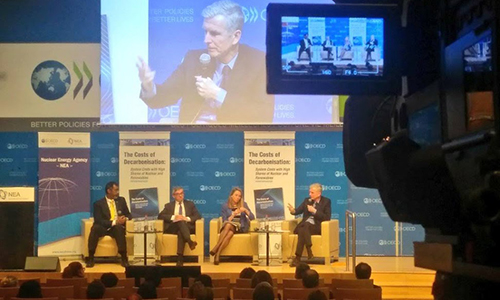 Did you miss the NEA webinar on the true costs of decarbonisation?
Did you miss the NEA webinar on the true costs of decarbonisation?
The NEA hosted a webinar on 17 January to preview the findings from the report The Costs of Decarbonisation: System Costs with High Shares of Nuclear and Renewables. The webinar featured introductory remarks by the OECD Secretary‑General Ángel Gurría and NEA Director‑General Magwood, who led a discussion on the importance of system costs in assessing the overall costs of the energy transitions under way. If you missed the live webcast, the video recording is available at oe.cd/nea‑system‑costs‑webinar‑2019.
 The Nuclear Innovation Bootcamp comes to Europe this summer
The Nuclear Innovation Bootcamp comes to Europe this summer
This year's Nuclear Innovation Bootcamp will take place from 19 to 30 August 2019 in Paris, France, hosted by the NEA, in collaboration with the French Nuclear Energy Society (SFEN), the University of Wisconsin‑Madison and the Nuclear Innovation Alliance (NIA). Launched in Silicon Valley three years ago, the Nuclear Innovation Bootcamp seeks to train students and early‑career professionals in skills essential to accelerating innovation in nuclear energy. The two‑week program will feature real‑world team projects, expert‑led sessions, and hands‑on activities to equip the participants with an in‑depth understanding of specific issues relating to nuclear innovation. The participants will also learn about venture fundamentals, markets, financing and the product development process. Applications may be submitted up until 15 May 2019. For more information, and to apply, visit nuclearinnovationbootcamp.org.
New publications and reports
NEA Annual Report 2018
Read the report [FR]
Nuclear Law Bulletin No. 101
Read the issue
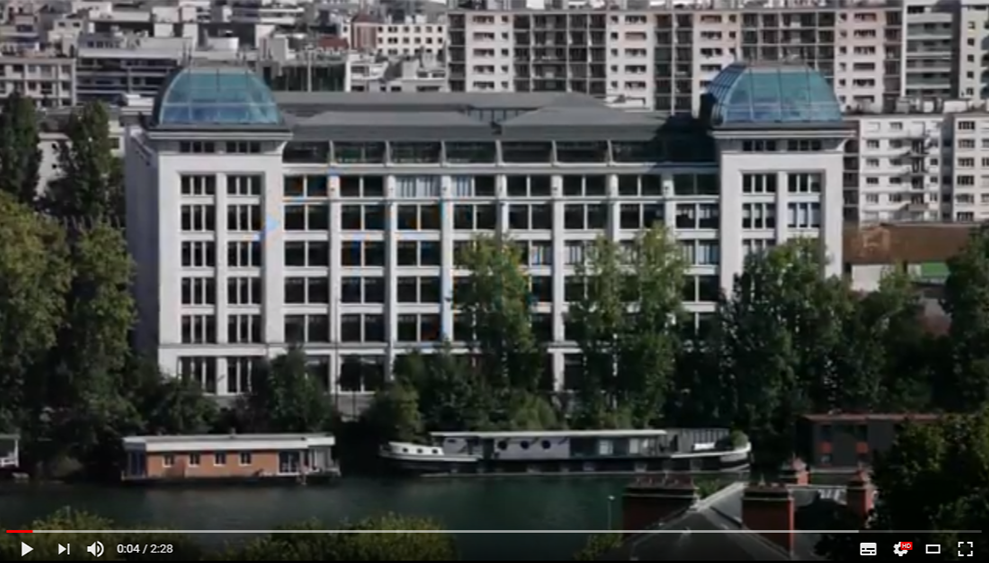 What is the NEA?
What is the NEA?
